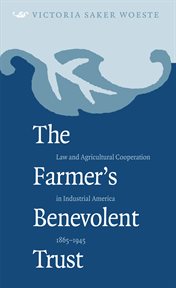Nonfiction
eBook
Details
PUBLISHED
DESCRIPTION
1 online resource
ISBN/ISSN
LANGUAGE
SERIES
NOTES
Americans have always regarded farming as a special calling, oneimbued with the Jeffersonian values of individualism and self-sufficiency. As Victoria Saker Woeste demonstrates, farming'scultural image continued to shape Americans' expectations ofrural society long after industrialization radically transformedthe business of agriculture. Even as farmers enthusiasticallyembraced cooperative marketing to create unprecedented industry-wide monopolies and control prices, they claimed they were simplypreserving their traditional place in society. In fact, the newlegal form of cooperation far outpaced judicial and legislativedevelopments at both the state and federal levels, resulting in alegal and political struggle to redefine the place of agriculturein the industrial market. Woeste shows that farmers were adept at both borrowing suchlegal forms as the corporate trust for their own purposes andobtaining legislative recognition of the new cooperative style.In the process, however, the first rule of capitalism--everyperson for him- or herself--trumped the traditional principle ofcooperation. After 1922, state and federal law wholly endorsedcooperation's new form. Indeed, says Woeste, because of itscorporate roots, this model of cooperation fit so neatly with theregulatory paradigms of the first half of the twentieth centurythat it became an essential policy of the modern administrativestate
Mode of access: World Wide Web







